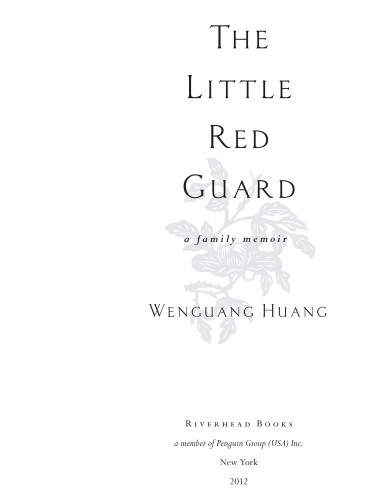
The Little Red Guard
A Family Memoir
کتاب های مرتبط
- اطلاعات
- نقد و بررسی
- دیدگاه کاربران
نقد و بررسی

Starred review from January 30, 2012
In his illuminating memoir, translator and freelance writer Huang chronicles growing up in central China during the 1970s. Weaving Chinese history and culture into his recollections, Huang reveals a family striving to fulfill a grandmother’s last wish during a period of rapid societal change. At 72, Huang’s grandmother became obsessed with her own death. She cajoled her family into promising they would bury rather than cremate her, a troublesome prospect for the family. The Communists, who insisted on cremation, had outlawed traditional Chinese burials. “Grandma’s request presented a dilemma for Father, who felt obligated to give grandma the burial she wanted but feared for his political future.” For the next 15 years, the family strained under the burden of the personal and financial issues involved while keeping their plans from curious authorities. Huang’s story intersects with the country’s sweeping political changes. The food rationing system was relaxed; cultural life blossomed; TV replaced radio as the main form of information and entertainment; and transportation improved. Huang studied English at a foreign language school, followed by studies in London. “Years of Communist education became like the ancient artifacts,” Huang writes. Huang’s coming-of-age story eloquently describes his family coping with change and how, in a turbulent time, he made sense of the world.

April 1, 2012
Writer and translator Wenguang Huang's candid memoir about growing up in the turbulent aftermath of the Chinese Cultural Revolution. In 1973, Mao's ruthless political campaign sought to bring an end to all "decadent" traditional practices. But the author would remember the year for a different reason--it was a time when his 71-year-old grandmother "became obsessed with death." Afraid that she would be cremated and rendered unable to reunite with her dead husband in the afterlife, she made her son, Wenguang Huang's father, promise that he would give her a traditional burial. Her son agreed and built a coffin, knowing that if he was discovered, the Communist Party would punish him and his family for disobedience. He made the author the official "coffin keeper." For the next nine years, he dutifully slept near what the family would refer to as Grandma's "longevity wood." In the end, the coffin really did become a kind of longevity talisman because the grandmother would live to be 87. Throughout the 16 years leading up to her death, the family often became embroiled in bitter battles over how they would inter the grandmother, who demanded a traditional Chinese burial next to her husband, whose grave was far from the family home. The one family member who suffered the most was the author's father, who passed away a year before his mother. A "filial son," he had made his mother's obsession his own, to the point where it "sucked him dry until there was nothing left but his own corpse." A trenchantly observed story that depicts the clash of traditional and modern Chinese culture with a powerful combination of sensitivity and mordant irony.
COPYRIGHT(2012) Kirkus Reviews, ALL RIGHTS RESERVED.

December 1, 2011
Huang's grandmother wanted not to be cremated but buried, a practice banned by China's government as backward-looking. Huang's father finally built her a coffin and appointed the author (at age eight) to be its guardian. Now a Chicago-based translator, writer, and NPR commentator, Huang began reflecting on how his coffin guarding and his family's 15-year-long focus on his grandmother's death must have shaped his life. Yet another interesting way to look at China, something readers crave.
Copyright 2011 Library Journal, LLC Used with permission.

April 1, 2012
There's a funny and telling scene in Huang's memoir in which the author, raised in central China in the 1970s, recalls his first trip to London on a student visa, and recounts his wonder at seeing grass grown just to be mowed. Yet as mysterious and misunderstood as the West is to Huang, so his description of life under Mao will come as a revelation to readers. The food rationing, party politics, and Cultural Revolution that Westerners have a vague knowledge of are all viewed through the highly personal lens of Huang's family. Using his grandmother's stubborn insistence on a traditional burial, banned under Mao, as a set piece, Huang demonstrates the tightrope many Chinese walked between their personal belief in ancient Confucian teachings and the public demands of the Communist government. Restrictions are relaxed, only to be renewed, and Huang struggles to come to terms with where his true allegiances lie. Today, as China continues to rapidly evolve, Huang, who now resides in the U.S., is firmly on the side of family and freedom.(Reprinted with permission of Booklist, copyright 2012, American Library Association.)

























دیدگاه کاربران